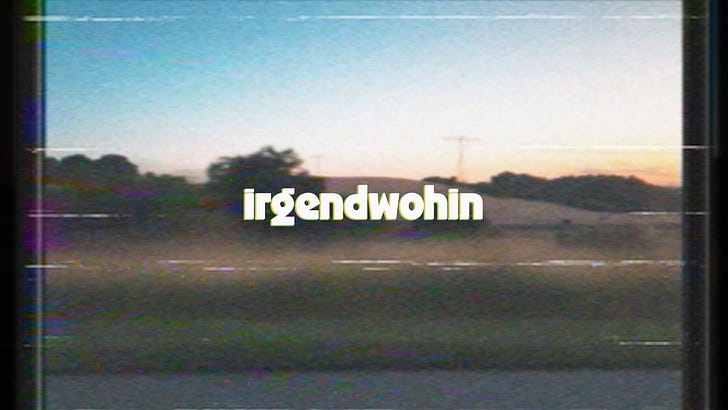Mit dir verloren auf Nachtstraßen irgendwohin
Lost with you on night roads heading anywhere – "Irgendwohin" by Antje Schomaker
If you’re looking for a feel-good, upbeat song for your holiday travel playlist, look no further. In “Irgendwohin”, indie pop singer Antje Schomaker is joined by Eva Briegel of the band JULI in singing a wholesome ode to friendship and good times on the road that’s sure to bring a smile to your face and get you planning a cross-country road trip with your best friend.
I love the home-movie feel of the music video, and also appreciate the song’s reference to “Mr. Brightside” by the Killers.
The song also gives us a chance to look more closely at adverbs of direction in German – what’s the difference between wo, irgendwo and irgendwohin, anyway?
Ich will nur
I only want
Mit dir verloren auf Nachtstraßen irgendwohin
(To be) lost with you on night roads heading anywhere
Und wir singen laut und schief: “Destiny is calling me”
And we sing loudly and off-key: “Destiny is calling me”
Wenn jemand fragt, wohin wir gehen, sagen wir: “Irgendwohin”
If someone asks where we’re going, we’ll say “Anywhere”
Sollen sie doch fragen, wir werden es keinem sagen
They can ask, we won’t tell anyone
So what does it mean to go irgendwohin?
This adverb of direction combines two interesting concepts in German: (1) the prefix irgend- and (2) adverb wohin.
Let’s start with the word wo. This tiny adverb correlates pretty directly with our English word “where” to describe (or ask for) location.
Wo ist das Auto?
Where is the car?
But while English uses the same word “where” to ask questions such as: “Where are you going?” or “Where are you coming from?”, German offers us to two additional adverbs of direction – wohin and woher.
Wohin gehst du?
Where are you going?Woher kommst du?
Where are you coming from?
As demonstrated in the sentences above, wohin is generally used in relation to movement away from the speaker, while woher is used in relation to movement towards the speaker.
Now the prefix irgend- comes into play. You may have seen words in German starting with irgend- before:
irgendwann – sometime / anytime
irgendwas – something / anything
irgendwie – somehow
irgendwo – somewhere / anywhere
As seen in the examples above, irgend- more or less correlates with adding the prefix “some” (or “any”) to an adverb, adding a touch of ambiguity – not at a specific time, but sometime; not at specific place, but somewhere, anywhere.
You can check out this article from YourDailyGerman for a much more thorough breakdown of the prefix irgend-.
So when we look at our song title “Irgendwohin” in the light of this information, we get a better idea of its meaning. This idea is further supported by the song’s lines:
Das Ziel ist eigentlich auch egal
The destination doesn’t really matterIch will nur
I only wantMit dir verloren auf Nachtstraßen irgendwohin
(To be) lost with you on night roads heading anywhere
The exact destination isn’t important here – what’s important is that the friends are heading out somewhere together.
And I can’t not point out a fantastic German idiom found in the song, which was new to me. When you’ve found someone with whom you can “steal horses” (mit jemandem Pferde stehlen können), it means you have a great friend with whom you can get into all sorts of mischief and rely upon completely. Understanding this idiom makes these lines from the song even more brilliant and hilarious:
Ich würde mit dir Pferde stehlen
I would steal horses with youHättest du keine Allergie
If you weren’t allergicWir wüssten doch eh nicht wohin mit denen
We wouldn’t know what to do with them anyway
Do you have a friend with whom you could “steal horses”?
Here are a few additional words from “Irgendwohin” to add to your vocabulary list:
losfahren – to drive off
einpennen – to fall asleep (colloquial)
regnen – to rain
egal – the same / it doesn’t matter
der Rückspiegel – the rear-view mirror
fahren – to drive
pleite – broke
das Ziel – the goal / destination
verloren – lost
die Nachtstraßen – the night streets
irgendwohin – heading somewhere / anywhere
laut – loud
schief – wrong / off-key
fragen – to ask
wohin – where (to)
sagen – to say
streiten – to fight
bleiben – to stay / to remain
das Album – the album
das Auto – the car
die Autobahn – the highway
das Meeresrauschen – the sound of the ocean
das Pferd / die Pferde – the horse / the horses
stehlen – to steal
die Allergie – the allergy
regelmäßig – regularly
manchmal – sometimes



